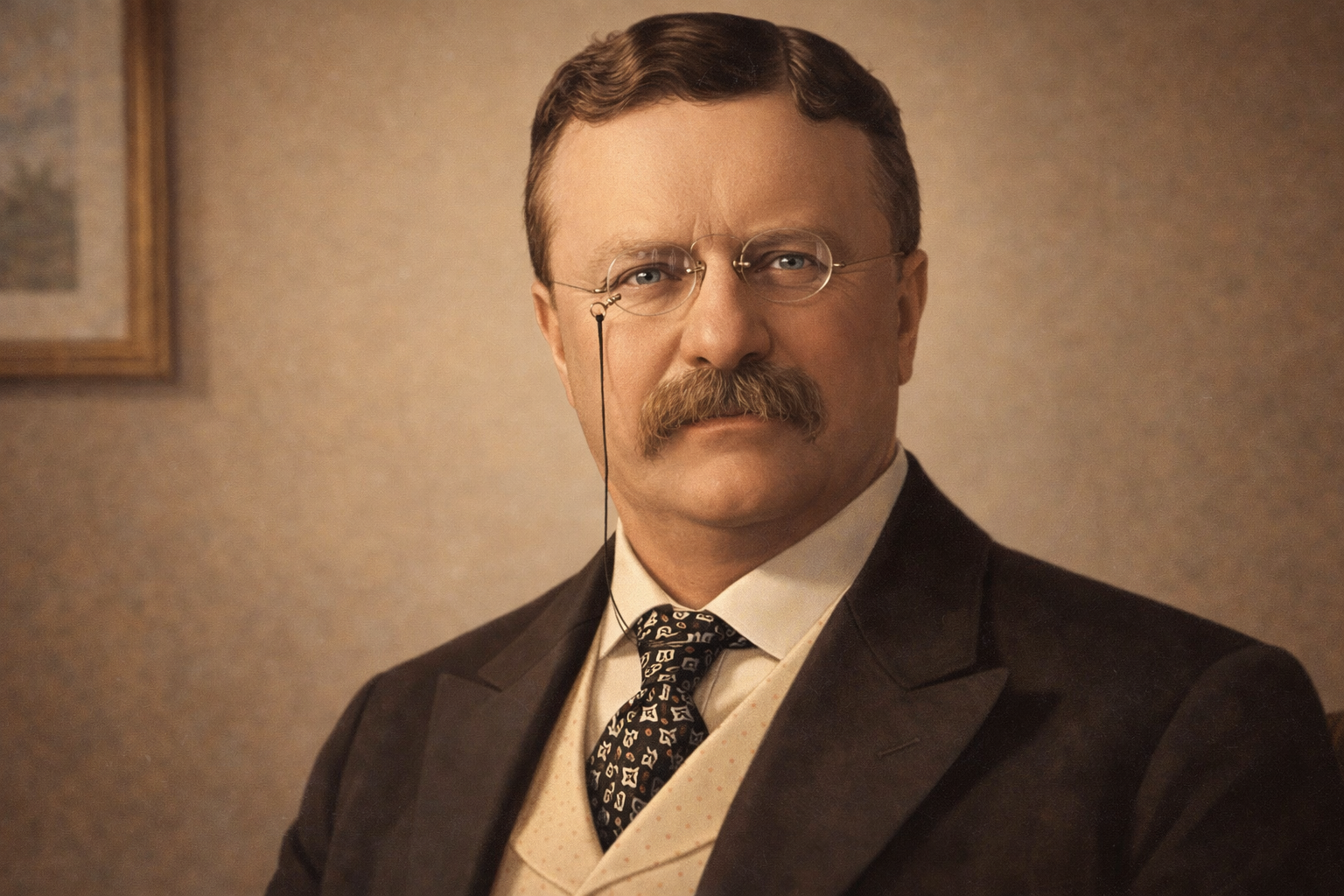Theodore Roosevelt’s life was a testament to the idea that willpower could bend fate. Born on October 27, 1858, in New York City, he was a frail, asthmatic boy who spent his early years gasping for breath while staring out the window at a world he longed to join.
Instead of surrendering to his weakness, he made himself a promise — he would “make his body” and forge a life of action. His father built him a home gym, and young Theodore trained relentlessly, learning early that character is not given, but carved.
From Harvard to the Rough Trails
By the time he entered Harvard University, Roosevelt had grown into a vigorous young man, as curious in books as he was in boxing rings. He once wrote,
“It is hard to fail, but it is worse never to have tried to succeed.”
At Harvard, he studied natural history, boxed competitively, and developed a taste for politics. Tragedy struck in 1884 when, on the same day, he lost both his young wife, Alice, and his mother.
Stricken with grief, he retreated to the Badlands of Dakota Territory, where the harsh frontier life of cattle ranching and hunting tempered his spirit like steel.
The Rough Rider
Roosevelt’s boundless energy soon found a new stage — the Spanish-American War of 1898. As leader of the Rough Riders, a volunteer cavalry, he charged up San Juan Hill under a hail of bullets, later remarking,
“Far better it is to dare mighty things, to win glorious triumphs, even though checkered by failure…”
His daring and grit made him a national hero overnight.
The Reluctant President
That same year, Roosevelt became Governor of New York, then Vice President under William McKinley. Fate turned again when McKinley was assassinated in 1901, making Roosevelt — at just 42 years old — the youngest President in U.S. history.
Roosevelt was passionate about the outdoors and nature. During a camping trip with naturalist John Muir in Yosemite, Roosevelt was so moved by the beauty of the wilderness that he doubled down on preserving America’s natural heritage.
He broke up monopolies, championed progressive reforms, protected workers, and preserved vast tracts of wilderness.
As president, he created 5 national parks, 18 national monuments, 150 national forests and over 230 million acres of protected public land. His efforts laid the foundation for the U.S. National Parks system — earning him the title of “The Conservation President.”
Peacemaker and Power Broker
Roosevelt’s foreign policy was summed up in his famous line:
“Speak softly and carry a big stick; you will go far.”
He mediated peace in the Russo-Japanese War, becoming the first American to win the Nobel Peace Prize.
At the same time, he projected American influence globally, overseeing the construction of the Panama Canal, a marvel that linked oceans and transformed world trade.
Teddy’s Bear
While on a hunting trip in Mississippi in 1902, Roosevelt refused to shoot a bear that had been tied up for him to make the kill easier. He considered it unsportsmanlike and inhumane.
This story was widely reported in the press. A toymaker later created a stuffed bear and called it “Teddy’s Bear” — giving birth to the beloved Teddy bear we know today.
The Last Charge
After leaving office in 1909, Roosevelt’s restless spirit refused retirement. He embarked on a grueling African safari, then an expedition down the uncharted River of Doubt in the Amazon.
In 1912, he returned to politics, splitting from his party to run as the Bull Moose candidate — surviving an assassination attempt. The bullet passed through his coat, a folded 50-page speech, and his steel eyeglass case — slowing it down but still lodging in his chest.
Instead of going to the hospital, Roosevelt stood before the crowd:
“It takes more than that to kill a Bull Moose,” he quipped.
He then proceeded to speak for 90 minutes with the bullet still inside him. Doctors later decided it was safer to leave the bullet in place, where it remained for the rest of his life.







In 1913, after his failed 1912 presidential run, Roosevelt joined an expedition to explore the River of Doubt in the Amazon rainforest. The trip was brutal — filled with dangerous rapids, disease, food shortages, and even death.
Roosevelt contracted a severe infection and almost died. He lost over 50 pounds and returned to the U.S. weak but proud of having contributed to the mapping of a previously uncharted river — now called the Roosevelt River.
Final Days
Theodore Roosevelt died in his sleep on January 6, 1919, at the age of 60. Vice President Thomas Marshall said,
“Death had to take Roosevelt sleeping, for if he had been awake, there would have been a fight.”
Legacy
He left behind a legacy of courage, reform, and untamed spirit — a reminder that greatness lies not in comfort, but in the willingness to step into the arena. His life roared with the belief that a man’s worth is measured by his deeds, not his years.
“Keep your eyes on the stars, and your feet on the ground.”

The Man in the Arena
“It is not the critic who counts: not the man who points out how the strong man stumbles or where the doer of deeds could have done better. The credit belongs to the man who is actually in the arena, whose face is marred by dust and sweat and blood, who strives valiantly, who errs and comes up short again and again, because there is no effort without error or shortcoming, but who knows the great enthusiasms, the great devotions, who spends himself for a worthy cause; who, at the best, knows, in the end, the triumph of high achievement, and who, at the worst, if he fails, at least he fails while daring greatly, so that his place shall never be with those cold and timid souls who knew neither victory nor defeat.“
